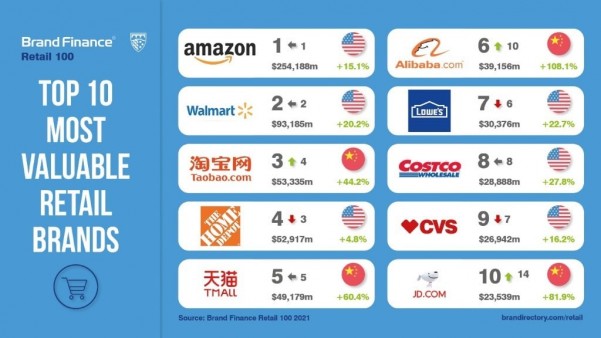Brand Finance has released its latest retail ranking that has been expanded to include 100 brands to give a fuller picture of the diverse sector. Unsurprisingly, various types of retailers have been impacted by the pandemic differently, with e-commerce brands faring the best, recording an average brand value growth of 38% and department stores suffering the worst, losing 11% of brand value on average.
Brand value is calculated using the Royalty Relief methodology which determines the value a company would be willing to pay to license its brand as if it did not own it. This approach involves estimating the future revenue attributable to a brand and calculating a royalty rate that would be charged for the use of the brand.
Amazon has retained the title of the world’s most valuable retail brand, recording a 15% brand value growth to US$254.2bn. The online giant is one of the few brands that has benefitted considerably from the pandemic and the resulting unprecedented surge in demand as consumers turned online following store closures. Over Q2 and Q3 of 2020, e-commerce platforms experienced the highest revenue growth since 2016.
Brand Finance suggested the recent announcement that founder and CEO Jeff Bezos is stepping down from the helm, could mark a new positive direction for the brand that has found itself at the centre of controversies, from negative coverage of his divorce, allegations regarding poor treatment of workers, and criticism for Bezos’s apparent reluctance to use wealth for philanthropic goals.
Apart from calculating brand value, Brand Finance also determines the relative strength of brands through a balanced scorecard of metrics evaluating marketing investment, stakeholder equity, and business performance. Certified by ISO 20671, Brand Finance’s assessment of stakeholder equity incorporates original market research data from over 50,000 respondents in nearly 30 countries and across more than 20 sectors.
According to these criteria, Amazon has also retained the title of the world’s strongest retail brand with a Brand Strength Index (BSI) score of 89.9 out of 100 and a corresponding elite AAA+ brand strength rating. Despite controversies, Amazon is loved by consumers. The brand has completely transformed the way in which purchases are made, and with a world-class reputation for speed, reliability and convenience, consumers continue to return to the site for all their shopping needs.
Richard Haigh, managing director, Brand Finance, commented: “Playing a crucial role in supporting a new economic mode in lockdown, Amazon has found itself at the centre of attention more than ever before. Many consumers find themselves converts to a reliance on the polished purchase experience Amazon provides, but the brand is not without critics.
“From questions about the treatment of workers, to pushback against a global corporation in support of local retailers, the company will have to deal with these challenges over the coming years. With Bezos recently announcing he is stepping aside, only time will tell the direction the brand will take under new leadership and if this will signal a marked change in operations.”
Whilst e-commerce retailers such as Alibaba and JD.com are the fastest growing in the Brand Finance ranking, many traditional bricks & mortar retailers, which have successfully leveraged technology to offer online delivery options and develop digital in-store improvements, have also fared well during the pandemic. Walmart has seen a 20% increase in brand value to US$93.2bn and retained its spot in second, following an impressive spike in earnings. With targeted investments in e-commerce and over 400,000 workers hired in the last year to stock shelves and fulfil online orders, Walmart has been quick to adapt to the surge in demand.
Similar strategies have been beneficial to Target (up 30% to US$20.7bn), Dollar General (up 28% to US$9.6bn), and Costco (up 28% to US$28.9bn) in the US, as well as E.Leclerc (up 27% to US$8.3bn) and El Corte Inglés (up 19% to US$6.1bn) in Europe, which have all seen significant brand value growth as they offered quick turnaround for online orders, reserved slots for elderly and at-risk shoppers, and implemented ship-from-store order fulfilment processes.
Mixed results have been posted across pure supermarket brands. The two highest-ranked supermarkets are Germany’s Aldi and Lidl, posting an 8% brand value increase and 9% brand value decrease, respectively. Aldi has embarked on a foray into the online retail space, successfully pivoting its offering in the face of the pandemic. The same strategy has not been undertaken by rival Lidl, with the CEO of the UK arm, Christian Härtnagel, arguing the pandemic has artificially inflated demand for online shopping and that the costs are simply too high.
In the UK, supermarket brands have also recorded mixed results. The most valuable supermarket brand in the nation, Tesco, has dropped 9% to US$10.0bn. Conversely, Asda (brand value US$6.5bn) and Morrisons (brand value US$3.3bn) have both seen a slight uptick in brand value this year, increasing by 2% and 6%.
France’s Carrefour has lost 7% of brand value to US$8.2bn, losing out on its top 20 spot, slipping to 24th.

Download a sample of Brand Finance Retail 100 2021 report here
NAM Implications:
- ‘World-class reputation for speed, reliability and convenience’ says it all
- Setting even higher hurdles for entry to compete…




